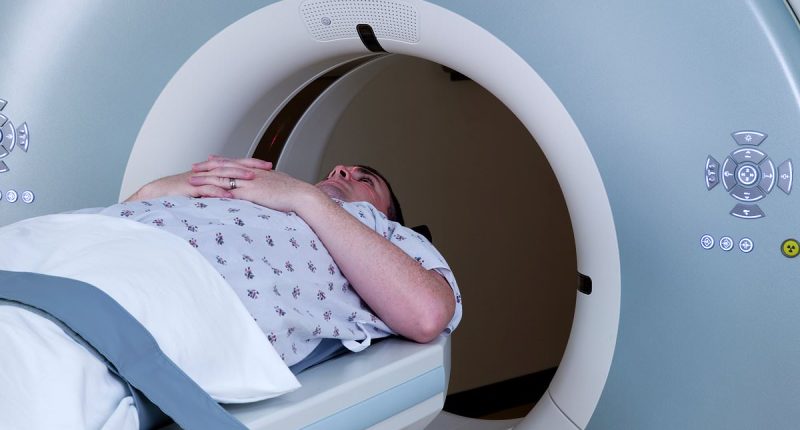Share this @internewscast.com
Health chiefs are set to introduce a groundbreaking screening scheme that aims to offer long-awaited hope for those who develop the UK’s most lethal cancer.
Pancreatic cancer—dubbed a ‘silent killer’ due to its subtle symptoms—kills just over 10,000 patients every year, about one death every hour.
It is typically diagnosed at late stages, as warning signs are easily mistaken for other problems.
But now, GP clinics will contact patients believed to be at high-risk of the disease, and call them in for urgent tests, in the hope of pre-empting symptoms.
Those considered at danger of developing the illness are the over 60s with a recent diagnosis of diabetes or sudden weight loss.
Despite numerous breakthroughs for other forms of the disease that are helping patients live longer, the outlook for pancreatic cancer patients remains shockingly dismal.
Just one in 20 of those diagnosed with the disease are expected to live to see the next decade, with more than half dying within just three months.
The new NHS pilot, involving more than 300 GP practices in England, aims to find patients at the earliest, most treatable stages of the disease.

Former England football manager Sven-Göran Eriksson died aged 76 in August last year after becoming terminally ill with pancreatic cancer. The Swedish legend—who said in January last year he had ‘best case a year’ to live after his diagnosis—was the first overseas boss to lead the England national team in 2001 . Pictured here in May 2024

Alan Rickman who starred in a host of blockbusters including as Professor Snape in the Harry Potter films died from pancreatic cancer in 2016 at the age of 69
Health service officials hope the £2million project, which will be in full swing this autumn, will result in at least 300 earlier diagnoses.
Currently only about one in five pancreatic cancer patients are diagnosed in the early stages of the disease when treatment has the greatest chance of success.
Medics will specifically look for recent cases of diabetes due to data suggesting about half of pancreatic cancer patients are diagnosed with the blood sugar condition shortly before they are found to have the disease.
This is because the cancer destroys the same insulin-producing cells in the pancreas—which help control blood sugar—that are also destroyed in diabetes.
These patients will be called in for urgent blood tests and medical scans.
If pancreatic cancer is spotted early, before it spreads throughout the body, about half of patients will survive at least a year.
But if cancer has already spread beyond the organ—as happens for the majority of patients— only one in 10 patients will survive a year.
Professor Peter Johnson, NHS national clinical director for cancer, said: ‘Pancreatic cancer is responsible for so many deaths because patients don’t usually notice symptoms until the cancer is at an advanced stage, which is why we need to find new ways to pick it up.

Currently, the majority of 10,500 people diagnosed with the disease each year in the UK die within three months. Part of the problem is that it’s often spotted too late. Knowing the subtle early symptoms of pancreatic cancer — including changes in toilet habits — could play a crucial role in boosting survival, say experts

Pancreatic cancer remains one of the least survivable forms of the disease and worryingly its on the rise. Source for data: Cancer Research UK
‘If your GP practice identifies you as at risk of pancreatic cancer, I urge you to come forward for testing as soon as possible.’
Health minister Karin Smyth added: ‘This targeted approach to identify people at risk of one of the most lethal cancers could give more people a fighting chance and spare the heartbreak of countless families.’
Alfie Bailey-Bearfield, head of influencing and health improvement at Pancreatic Cancer UK, said: ‘Many of the people who are referred for a CT scan during the pilot will not have pancreatic cancer, but for those that do, the impact could be lifesaving.
‘Subject to the pilot’s success, we will be calling for this pilot to be expanded across the country to help give more people affected by the deadliest common cancer the very best chance of survival.’
Previous research has shown that people over 50 with a new case of type 2 diabetes have a higher chance of being diagnosed with pancreatic cancer within three years.
While pancreatic cancer is most likely to strike people over the age 75—with 47 per cent of all cases in this demographic—younger groups can also get the disease.
Last year MailOnline highlighted a ‘frightening’ explosion of young women developing the disease.
Rates of pancreatic cancer have soared by up to 200 per cent in women under the age of 25 since the 1990s.
While numbers remain low, oncologists cannot explain the surge in young women, with no such spike noted in men of the same age.
Overall, incidences of the disease have increased by around 17 per cent in Britain over the same timespan, with soaring obesity rates suspected to be behind the trend.
A number of celebrity diagnoses in recent years have thrown pancreatic cancer into the spotlight.
Last year former England manager Sven-Goran Eriksson, 76, died after a battle with the disease.
Other famous victims include legendary actors Patrick Swayze and Alan Rickman as well as Apple’s iconic founder Steve Jobs and The Smiths bassist Andy Rourke.
Potential symptoms of pancreatic cancer include jaundice, where the whites of the eyes and skin turn a yellow hue, alongside itchy skin and darker urine.
Other possible signs include loss of appetite, unintended weight loss, constipation or bloating.
While these symptoms are unlikely to be cancer it is important that they are checked out by a GP early just in case, especially if people have had them for over four weeks.
The pancreas is a tadpole-shaped organ that forms part of the digestive system and also performs a crucial role in hormone regulation.
It is located just behind the stomach and is about 25cm in length.
In its digestive role, it helps produce enzymes that help the body break down food into the nutrients it needs.
It is also critical in making hormones responsible for controlling blood sugar levels in the body.
Charity, Cancer Research UK, estimates 22 per cent of cases of the disease are caused by smoking and 12 per cent by obesity.













